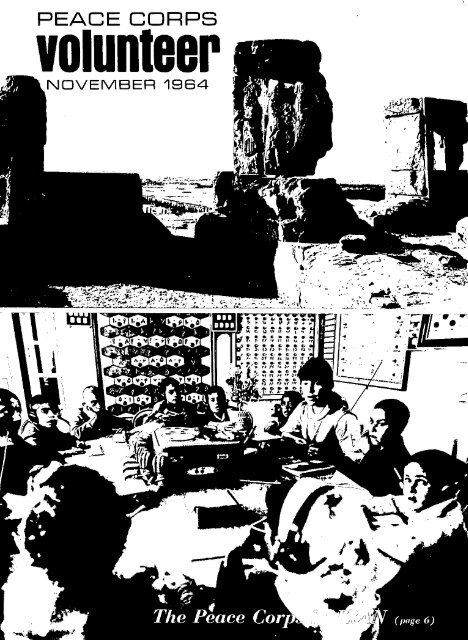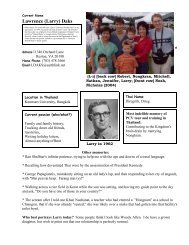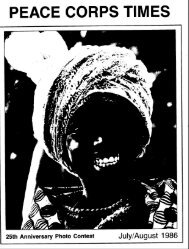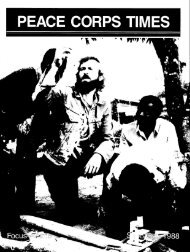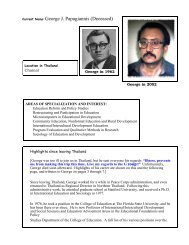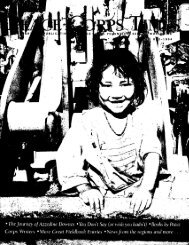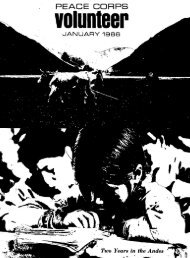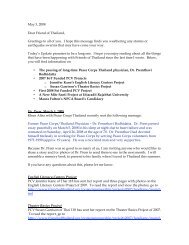PEACE CORPS
Peace Corps Volunteer â November 1964 - Peace Corps Online
Peace Corps Volunteer â November 1964 - Peace Corps Online
- No tags were found...
Create successful ePaper yourself
Turn your PDF publications into a flip-book with our unique Google optimized e-Paper software.
<strong>PEACE</strong><br />
<strong>CORPS</strong>
EDITORIAL [:=:_ :..–_-: .::--::.-::”--- =::”-::.<br />
An Anniversary<br />
Note<br />
This month marks the beginning of the third year of<br />
publication of THE VOLUNTEER. With our anniversary,<br />
we have introduced some changes in format. But though<br />
its ?ppearance is slightly altered, THE VOLUNTEER will<br />
continue in what has been from the beginning its primary<br />
role: that of a journal of information about the Peace<br />
Corps for Peace Corps Volunteers.<br />
We are read in a good many places by a good mariy<br />
people—in the U.S. by’ Peace Corps parents, college and<br />
university students, newspapermen, libra~ visitors, members<br />
of Congress, staffs of foreign embassies; overseas by<br />
host< ountry governments, volunteers of other countries,<br />
American diplomatic missions. Although mindful of our<br />
varied readership, we still t~ to tailor the product for the<br />
tastes of Volunteers, For some, we miss the mark—we<br />
print only “success stories,” it is charged, and tales of the<br />
super-Volunteer. Actually, as we noted in an editorial<br />
last November, we have printed a wide range of stories by<br />
Volunteers on their achievements and their fmstrations,<br />
as well as a number of diverse and often critical opinions<br />
of the Peace Corps by persons outside tbe agency.<br />
Lately, however, there bas been a dearth of dissent—<br />
the Peace Corps is highly regarded almost everywhere,<br />
and is ranked in public esteem, as someone has noted,<br />
‘
~~4<br />
“’\<br />
. .<br />
Cynthia Ann Myers<br />
\ r<br />
A Peace Corps Volunteer teacher in<br />
India was drowned Nov. I as she was<br />
swimming in the Bay of Bengal near<br />
Bimlipatnam, in A“dhra Pradesh state.<br />
Cynthia Ann Myers, 23, was caught<br />
in a strong undertow as she and Vol...<br />
leer Sam Boggess, 22, of Urbana, Ill.,<br />
swam together near the shore. Boggess<br />
lried to help but the two were separated<br />
by a wave and she was lost from sight.<br />
Fishermen pulled Boggess, exhausted,<br />
from the water.<br />
Her body was later recovered, cre.<br />
mated in Vizagapatnam, a“d the remains<br />
take” to the U.S. Funeral services were<br />
held Nov. 11 in Be”tleyville, Pa.<br />
Miss Myers had apparently ~one to<br />
Bimlipatnam, a small, isolated co!n.<br />
munity, to visit Boggess and two other<br />
Volunteers assigned there, Richard Beeler<br />
( Pottiam, NY.) and Mary Finn (Chicago),<br />
according to Dr. Charles Houston.<br />
India Peace Corps Representative.<br />
Schools in A.dhra Pradesh were closed<br />
for a week or more for DivaIi, a major<br />
Indian festival holiday, celebrated this<br />
year on Nov. 3-4.<br />
Assigned to teach secondarpschool<br />
science in Vijay wada, an Andhra Pradesh<br />
trading center south of Bimlipatnam,<br />
Miss Myers went to India in %ptember,<br />
1963, after requesting assignment<br />
there and particularly i. the Andhra<br />
Pradesh area. She had gone to college<br />
with friends who had lived in the region,<br />
She was described by Dr. Houston<br />
earlier this year as “A deeply dedicated<br />
Volunteer, a very competent leacher; she<br />
had a quiet, patient dedication that inspired<br />
everyone she came i“ contact<br />
with.,,<br />
Miss Myers was born in Bentleyville,<br />
Pa., attended Monongahela High School<br />
a“d the” Malone College i. Canton, O.<br />
She worked her way through college as<br />
a switchboard operator, kitchen worker,<br />
and waitress, a“d received a B.A. i.<br />
zooloEy i“ J~t”e, 1963. She was an<br />
ex:elle. t student, and fo””d time to be<br />
ed,lor of her college yearbook a“d presi.<br />
dent of her dormitory gover”me”t. She<br />
was interested i“ medical tecb”ology,<br />
a“d had hoped someday to do graduate<br />
work in parasitology.<br />
Her mother, Iva Mountser Myen, was<br />
killed in an auto accident on Dec. 26,<br />
1963. Miss Myers came back to [he<br />
U. S.’ on emergency leave. then returned<br />
to her Peace Corps assignment in January.<br />
Her father, Charles B. Myers, is<br />
now living in Perry, Kan. She is also survived<br />
by two brothers and three sisters.<br />
Miss Myers had devoted almost all of her<br />
readjustment allowance to helping one of<br />
her sisters, Linda, 19, through college.<br />
She was the tenth Volunteer to die<br />
in service.<br />
Two New Directors<br />
Two more Peace Corps divisions have<br />
new directors, under appointments an.<br />
nounced recently by Director Sargent<br />
Shriver.<br />
Thomas D, Scott has been apWinted<br />
Director of the Division of priyatc a“d<br />
l“ternational Organizations, sucmedi”g<br />
J, Norman Parmer, who ret”r”ed i“<br />
September to a professorship o“ the history<br />
faculty at Northern Illinois U“iver.<br />
Last<br />
sity. Scott bad been Deputy Director of<br />
the Division of University, Private and international<br />
Co-operation since he joined<br />
the Peace Corps Staff in March, 1962.<br />
(1” September, tbe division took a<br />
shorter tide as its university functions<br />
were transferred to the Division of<br />
Training, which bemme (he Division of<br />
University Relations and Training. )<br />
Scott, 40, came to the Peace Corps<br />
after serving as Eastern Regionat Director<br />
of the Foreign Policy Assn. He is a<br />
1948 graduate of Syracuse University.<br />
holding a B.A. in political science. In<br />
1961 he received a master-of-public<br />
administration degree from the Maxwell<br />
Graduale Schwl of Citizenship and Public<br />
Affairs of Syracuse University.<br />
From 1949 to 195 I he was an assistant<br />
professor of mtiern Western history at<br />
West China Union University at Cheng’.<br />
Tu, Szcchuan, China, and a guest Iec.<br />
t“rer at National Chen Hwa University.<br />
He was deported by the Communist<br />
Chinese regime in 1951<br />
Serving as a field officer for the Asia<br />
Foundation from 1952 to 1959, he had<br />
November<br />
P,, I Co”kIi”<br />
In Quito, Ecuador, the news from America became local news<br />
3<br />
/.<br />
A
msignments h Hong Kong, Malaya,<br />
Borneo, and Sngapore. Between 1959<br />
and 1961 he served Syracuse University<br />
in several capacities, including that of<br />
executive director of Syracuse-in-Asia.<br />
He is married and has lwo children.<br />
In another appointment, Robert E.<br />
Krug Jr. was named Director of Research.<br />
Prior to his appointment, Krug<br />
served as consultant to the Research<br />
Division and was executive scientist and<br />
director of the measurement a“d eval”a.<br />
tion program at the American I.slil.te<br />
for Research.<br />
He conducted the first Peace Corps<br />
research project, a sludy of the selection<br />
of the first 18 groups of Volunteers 10<br />
enter training in 1961-62.<br />
Kr”g holds three degrees from Ohio<br />
State University, all in psychology; be<br />
received a B.A. degree in 1948, and M.A.<br />
in 1949, and a Ph.D. in 1955. He has<br />
been an assistant professor of psychology<br />
at Trinity University, a research =sociate<br />
i“ training at the Ohio State University<br />
Research Foundation, and an associate<br />
proiesor is psychometrics al Carnegie<br />
Insti[ulc of Psychology,<br />
A World War 11 veteran of the Pacific<br />
theater, he is married and has five<br />
children.<br />
Now, Language Tests<br />
Volunteers completing service in the<br />
future will take lan6.age.proficiency<br />
tests administered by the Foreign Service<br />
lnstitule,<br />
In announcing the new procedure,<br />
Warren W, Wiggins, Associate Director<br />
for Program Development and Operations,<br />
said “We believe language proficiency<br />
is an essential element in achiev.<br />
ing the objectives of Peace Corps Service.<br />
We will continue to step-up our language<br />
programs bolb during training and overseas:<br />
The end.of. service tesb have been administered<br />
by FS1 in a few Peace Corps<br />
programs this past year. Because the<br />
tests had contributed 10 the agency’s language<br />
pro8ram, Wggins said, a worldwide<br />
expansion has been requested to<br />
cover all Volunteers completing scwice.<br />
Tests will also be given in as many<br />
projects as possible at the halfway point<br />
in the Volunteer’s service. This past summer,<br />
Peace Corps !rainees have taken a<br />
Iang”age exam at the end of the training<br />
period, Restdls of those exams, together<br />
with the !rainee,s score on tbe Modern<br />
Language Aptitude Tes[, are forwarded<br />
to Peace Corps Representatives abroad,<br />
so a gauge may be made of the Volunteer’s<br />
language-learning progress.<br />
Resulls of the end.o f-service language<br />
tests, together with the end.of. training<br />
restdts, will offer guidance to the Selection<br />
Division in predicting trainees’ PO<br />
te.dal for language learning and will<br />
Peace Corps Trainee at Putney, Vt., gets<br />
French lesson from Guinean instructor.<br />
also assist the Training Dlvisi?n in considering<br />
adequacy of current language<br />
lraining, in addition to helping Representatives<br />
place Vol.nteem and determine<br />
needs for in.serv ice Ianpuagf training,<br />
Wiggins said.<br />
It is also hoped anticipation of tbe<br />
tests will stimulate Volunteer efforts to<br />
Iea,. the host-country tongue, ~he added.<br />
Results of the end.o f-service tats, scored<br />
on a standard FSI scalt, wi!l provide<br />
Vol””teers with a rating—b(oadly accepted<br />
in and out of governmenl—indica[ing<br />
language comwtence at a time<br />
of peak fluency.<br />
The tests are oral, and Vol~nteers are<br />
tested individually, Normally, a linguist<br />
conducts the test wilh the help of a<br />
native-speaker,<br />
The language test measures command<br />
of tbe generallycurrent vernacular and<br />
not of particular dialects. R?dngs are<br />
designed to indicate usefulness of the<br />
Volu”teer,s k“owled~e beyond 1the single<br />
environment in which he acquired it.<br />
Vol””teers Make Same Mist&es<br />
,,Some Volunteem may feel penalized<br />
by this s[andard; Wiggins said!, ‘“But tbe<br />
Foreign Service Inslilute has ~ound that<br />
Volunteers generally make the same<br />
kinds of mistakes as do other Americans<br />
learning (be language. The Peace COrPS<br />
will reco~nize [be relatively few areas<br />
where lhe language test will not be a<br />
“fair’ indication of the Volun~eer’s !a”-<br />
g“age ability. In all situations, ~olunteers<br />
should know that if they have made an<br />
effort to progress beyond regional swech<br />
or the speech patterns of their work situations,<br />
Iheir language skill will be .<br />
much s[ronger aswt i“ any professional<br />
4<br />
i<br />
field; he said.<br />
“The test is necessarily designed to<br />
measure only control of lhe language—<br />
structure, vocabulary, pronunciation, and<br />
so forth—and nof gross ability to communicate.<br />
Some Voluntcem who do well<br />
in tbe language test may have inarticulate<br />
natures which limil their ability to get<br />
ideas across,,> Wiggins said,<br />
“Other Volunteers may butcher tbe<br />
niceties of the language but communicate<br />
beautifully with their arms and hands.<br />
Allho.gh it helps a Volunteer to build<br />
an effective working knowledge of the<br />
language, whatever bis native endowment<br />
in personality, the test in itwlf<br />
should not be considered a measure of<br />
his over-all ability to communicate with<br />
host-country nationals?’<br />
Tesls are rated on an absolute, rather<br />
than relative scale, and scored S-1<br />
to s-5:<br />
. S-l—Elementary proficiency; able<br />
to satisfy routine travel needs and minimum<br />
courtesy requirements.<br />
. S-2—Limited working proficiency;<br />
able to satisfy routine social demands and<br />
limited work requirement.<br />
. S-3—Mi.imum professional proficiency;<br />
able to speak the language with<br />
sufficient structural accuracy and vocabulary<br />
to salisfy all normal social and work<br />
requirements and handle professional<br />
disc. ssio”s wi[hi” a special field.<br />
● S-4—FU II professional proficiency:<br />
able to use the language fluently and<br />
acc”ratety on all levels normally, pertinent<br />
to professional needs.<br />
. S-5—Native or btlingual proficiency;<br />
speaking proficiency equivalent to that<br />
of an educated native speaker.<br />
TO A GREEN WORLO<br />
The monsoon’s upon us, romantic<br />
~m told<br />
Well il is if you’re par[ial to<br />
cobras and mold,<br />
Tbe heavenly odor of damp musty<br />
dresses,<br />
And flattering lines of those dull<br />
stringy tresses.<br />
The whole world looks green in this<br />
wo”derf”l wealher,<br />
Underwear sprouts, to say nothing<br />
of leather.<br />
The books stand quite proud, for<br />
unlike any others<br />
They,ce darli”sly dapper in<br />
“e w furry covers.<br />
But Sarge, we won’t fail, there’s<br />
“ot a quitter among us,<br />
We’ll win for the free world<br />
the War of the Fungus.<br />
—By Ann Louise Rosenblatt<br />
(Chester. Pa.)<br />
Reprinted from rbe &osI Pokiston<br />
Pence Corps Jo,,r,rnl
The<br />
Married<br />
Corps<br />
The wnc who orcdicted the Peace<br />
Corps wou~d prove’ to be “the WOIICS<br />
great-t matrimonial agency” may not<br />
have been, far from wrong<br />
A tally of Volunteers and trainees as<br />
of Sept. 30 shows 1160 as married, of a<br />
lotal of 9763 i. service. About 6 percent—38<br />
cot!ples—were married just<br />
priOr 10 departure Ove~eas OF while<br />
working abroad.<br />
The project with the greatat number<br />
of married Volunteers is Nigeria, with<br />
102 of a total 612 Volunteers and trainees<br />
~ssigned to (he coltntr% Brazil follows<br />
with 84 among 588. then comes<br />
per. with 78 among 531, Liberia with<br />
74 among 356, and E!hiopia with 64<br />
among 444. Two West African countries<br />
had no married co~,pies i“ service:<br />
Gabon, with 66 Volunteers (55 men and<br />
1I women), a“d the Ivory Coast, with 16<br />
Vol.”teers (8 men a“d 8 women), I“<br />
the Peace Corps as of Sept. 30, i“cl.ding<br />
trainees, were 5863 me” a“d 3900<br />
women,<br />
Altogether, there have been 169 i“-<br />
servicc Volt, nteer marriages recorded i“<br />
Washington.<br />
Honors for the first Vol.ntecrs to be<br />
married in service go to Dell Chris[ia”so”<br />
tThief River Falls, Mi””.) a“d Charlotte<br />
Larson (Cambridge, Min”.), who were<br />
wed o. Nov. 5, 1961, i“ West Pakistan,<br />
The mosl reccntl~recordcd marriage, on<br />
the other hand, W.,S bct”een Vol””teers<br />
Constance Coe (Whittier, Calif,) and<br />
Wolfgang Ba.er (Logan, Utah) on Oct.<br />
10 in Lag”.., the Philippines.<br />
In 28 instances VolL,ntcers have mar.<br />
ried host.country nationals, inclt,di”g 12<br />
such unions in (he Philippines and 12<br />
in Latin America. Only five women<br />
Vol”nleem have taken host-country h“sbands.<br />
A few Volunteer COUPleS have started<br />
families while i. service. Fifteen babies<br />
have bee” born to Volunteers in Africa,<br />
six in bali” America. two in (he Near<br />
East and South Asia a“d three i. tbe<br />
Far East.<br />
Tanganyika 1 Volunteer James WHara<br />
(Bethel P.rk, Pa.) a“d h]is wife, Margaret,<br />
produced the only set of Peace Corps<br />
twins on Jan. 17, 1963. Tbe OHara<br />
family completed service this past June.<br />
Peace Corps policies o. marria~e and<br />
Pr.fi . . ..y are b.sed o. whether vol.. -<br />
leers concerned can continue to serve<br />
effectively, as determined by tbe Peace<br />
Corps Represent alive. He must decide<br />
whe[her Volt, nteers may remain i. serv.<br />
ice after marriage, laki”g acco. ”t of job<br />
and housing changes necessary to accommodate<br />
lhe couple.<br />
Whether CO”PI.S expecting a child may<br />
Contint,e in service is also determined by<br />
the Representative, and the Peace Corps<br />
doctor i“ lhe co””try. If heallb hazards<br />
are great, or effectiveness of the couple<br />
is impaired by lbe b~,rde” of caring for<br />
a child, Volunteers ore asked to resign.<br />
‘Time<br />
On the eve of his election, President<br />
Johnson marked a Peace Corps anniversary,<br />
and commented on lhe future of<br />
the or~a”ization, Following is the text<br />
of his statement:<br />
“Four yearn ago today John Kennedy<br />
proposed the Peace Corps. Then it was<br />
a promise. Now it is a reality.<br />
“To the 10,000 Volunteers serving in<br />
46 co”ntrieeto the I I0,000 Americans<br />
wbo have applied 10 become Vol. n-<br />
teers—go the thanks of this nation.<br />
Thro”gb their hard work a“d devoled<br />
service lhe pioneering lradilion of America<br />
has been renewed, and our name is<br />
bo”ored anew among the developing nations<br />
of Africa, Asia, and Latin America.<br />
to Go Forward’<br />
“Bu1 this is no time to resi on the<br />
achievements of tbe last four years. This<br />
is the time to go forward.<br />
‘.1” the “exl four years we must double<br />
the sim and still f.ether raise the quality<br />
of lhe Peace Corps. Nearly every cot,ntry<br />
where Volunteers are now serving has<br />
asked for more-ftcn two. three, Or<br />
four times more. Many muntries arc<br />
on the “waiting list.” We must nol lose<br />
this practical opportunity to assist friendly<br />
nations in their self-help efforts in<br />
peaceful development.<br />
‘.For the next stage of the Peace Corps,<br />
se need applications to serve from about<br />
10 percent of the graduating class of our<br />
colleges and universities, we need more<br />
applications from skilled workers i“ o“r<br />
factories a“d on ot]r farms, we need<br />
more experienced teachers. more doctors,<br />
more ntlrses, more senior citizens.<br />
“And as five to ten thousand Volunteers<br />
return from two years of ove~eas<br />
service we must see that their fint-hand<br />
experience is put to good use, in ot, r<br />
schools and universities, in American<br />
private enterprise, in our city and slate<br />
government, in our War on Poverty, and<br />
in all our Federal services, incl.d inn [be<br />
Foreign Service,,><br />
Volu. teem who have completed service: 3,113. Fipms .s of OCL 31, 1964<br />
5
For want of a woodworking lathe, Volunteer Chuck Warsing (Saxton, Pal) teaches<br />
woodworking on a metalworking lathe to young inmates of Isfahan work camp.<br />
IRAN<br />
‘We Are Glad You Have Com_We Need You)<br />
BY J.y<br />
Crook<br />
When the latest two Eroups of Peace<br />
Corps Volunteers arrived at Mehrabad,<br />
Tehra..s sleek, air-conditioned airport,<br />
and were whisked into the city on a<br />
well-lit divided highway, there were<br />
many expressions of astonishment a“d<br />
dismay, ,J.s[ what are we doing here~<br />
was a q.estio” asked more than once,<br />
The . ..[ morning, f~ced wi[h 20thcent.<br />
ry trafic snarls caused hy Tehra”’s<br />
200,000 motor vehicles, and seeing new<br />
buildings, supermarkets, a“d other evi.<br />
dences of prosperity, the Volunteer beg.”<br />
10 go thro.gb a different kind of culture<br />
shock: if IF.” is like this, who “e~d~ ~~?<br />
The answer mighl k Eiven i“ Ardehil,<br />
475 miles northwest of Tehran, When<br />
Volunteer English teachecs Frank and<br />
Pat Vergata (New York City) first met<br />
one of their counterparts, Mr. Mohajeri,<br />
the Iranian said simply, ‘”ch,,,<br />
Vnfon”nately, the oil-born wealth of<br />
Ira”>s economy has not spread to the<br />
vast rndjority of her people, For the vi].<br />
IaEers, who comprise two.thirds of I,an,,<br />
23 million people, 20th-ce”t”ry life hns<br />
brought many discomfit”rcs a“d di~]oca.<br />
lion but few amenities.<br />
The answer to who needs the Peace<br />
Corps?, could k found i“ wealthy<br />
Tehran itself, eve” though it consumes<br />
half tbe co”ntry,s electric power and co”-<br />
tains half the Iilerate populati~: Leslie<br />
Miller (New Rochelle, N.Y, ), a.$s,g.ed to<br />
work in Tehran, was disappo!. ted that<br />
she wo”ldn,t be o“t i“ the field, wbece<br />
she felt sbe would he “ceded “bre. The”<br />
she went to South Tehra” and ~isited the<br />
litllc school where she would b~ working.<br />
After a mor”ing,s look at [he “arrow<br />
alleys, mud walls, tattered clothes, poor<br />
health. a“d seeinE [he eaEer ekpecta”cy<br />
of tbe school children, she r“~hed into<br />
the Peace Corps office and demanded to<br />
know why everyone had”,t hee~ assigned<br />
to work i“ Tebran.<br />
I<br />
Ican, like many other developing nations,<br />
has o“e foot planted sq~ely in<br />
tbe 20th ce”t”ry a“d lhe other some.<br />
where back near the 13th, L~aders i“<br />
and o“t of government are tr~ing hard<br />
10 bring Iran technologically Ii”to the<br />
Pre=nl with a reworking of past social,<br />
moral, and aesthelic values. Th~ physical<br />
remains of 3000 years and mor!e of his.<br />
tory con fco.t [he modern Ira. jan from<br />
the emply gateways of Perse~lis, the<br />
8r000 sculptures at Taq-i-Bu~lan, tbe<br />
gleaming tiles of Safavid Isfab~: They<br />
ace reminders of a proud impe~~al past.<br />
Persians organized the first world+ mpire<br />
i“ hislory, five ce”l”ries before ~he birth<br />
of Christ. Tbcy worked o“t an admin-<br />
6<br />
Doris Witriol (New York City), Dorothy<br />
Davidson (Gainesvi II:, Ga.), Carol Posey<br />
(Jackson, Miss.) visit Isfahan bazaar,<br />
islrative and commt~nications system rhal<br />
forms the basis for many Western<br />
i“sli rutions.<br />
The co””try was submerged by Arab<br />
conquest in (he seventh century, a“d<br />
with the Arabs came Islam with its all.<br />
pervasive code of life. But a cent.ry<br />
later, Persians were dominating the intellectual<br />
and philosophical life of Islam.<br />
The Persians accepted [slam gradually<br />
and wilh increasing enthusiasm. adding<br />
to il something of the Persia” historical<br />
experience. Reflecting the ““ique charac.<br />
ter of her people eve” today, Persia”<br />
Islam differs in many points of faith and<br />
ritual from the bulk of ocher Muslims<br />
[hrougho”t tbe world.<br />
During the 1blh a“d 17th ce”luries,<br />
splendor a“d glory once again returned<br />
10 Iran. Is faha”, the magnificently.<br />
adorned capital of the Safavid Dynasty,<br />
pr.udly took ber name from ‘,”c,I... ”<br />
;“ho”—half the world.<br />
Todays Iran, after [he Vicissitlldes of<br />
19tb-cent.ry colonial macbina[ ion, is still<br />
a formidable land. Her area of 628,000<br />
square miles is nearly as large as Texas,<br />
New Mexico, Arizona, and California<br />
combined. Her divecse geography con.<br />
tai”s the highest mo. ntai” between the<br />
Himalayas and [he Atlantic Ocean ( Mt.<br />
Demave”d at 18,000 feet i“ tbe Elb.rz<br />
range) as well as a national breadbasket<br />
on the edge of the Caspia” Sea at 75<br />
feet below sea level. There are still<br />
imme”sc deserts throush which journeys<br />
arc calculated by days i.slead of kilometers,<br />
yet the Caspian Sea coast gek<br />
more rain than any. other area in the
convince school authorities that his sparse<br />
shop equipment simply co”ld”,t do the<br />
job in instrt]ction or repair. The money<br />
had bee” b~,dgeted but the s~)pervisory<br />
slaff didn’t realize the need, But after a<br />
year of wailing :t”d cajoling, the staff did<br />
become convinced. The eqltipment was<br />
bought; !he Kerma” shop became work.<br />
able. But it took :$ year of Leonard’s<br />
Pesce Corps time jt,st 10 get slarled.<br />
These first Volunteers laid the found:l-<br />
Iions for the programs present expa”.<br />
Sion in the fields of agriculture and voca.<br />
tional<br />
Rene<br />
.d~,ca[ion, i.st as<br />
Smith (Annapolis,<br />
teachers like<br />
hfd. ), Dave<br />
W:tngler (BtIffalO, N.Y. ), and Jerry Cli”-<br />
10” (San Jose, Calif. ) did i“ English.<br />
A year after the :!rrival of Iran I came<br />
[he seven members of Iran Il. They<br />
have been assigned to teach in vocational<br />
schools in Tehra” a“d Isfaha.,<br />
Dick MenrLer (Costa Mesa. Calif .). i“<br />
About the Rep<br />
Cleo Shook has<br />
been Peace Corps<br />
Representative in @. .h<br />
Iran since July of<br />
this year, He n P $<br />
sewed from 1961 a 1<br />
to 1963 as Pro.<br />
grams Operations<br />
Officer for the Far w<br />
East Regional Of.<br />
fice of the Peace<br />
CorDs. then left<br />
A<br />
the’ agency to join the Ken R. White<br />
firm of consulting engineers i“ Denver,<br />
as vice president in charge of interns.<br />
tional operations.<br />
A native of Glendale, Calif., he attended<br />
the California Institute of Tech.<br />
nology in Pasadena from 1942.1945 in a<br />
war program sponsored by the Army<br />
Signal Corps. After sewice in the Far<br />
East as a communications officer, he<br />
was assigned in 1946 to Yenching University<br />
in Peiping to study Mandarin<br />
Chinese and economics; he also sewed<br />
as a part-time physics Instructor at the<br />
university.<br />
In 19M he returned to the U.S. and<br />
Is faha., was responsible for developing<br />
the Iiaiso” to get s“rpl”s a“d discarded<br />
World War 1[ Jra”ian army ir,,cks for<br />
use in i“str,, cdo. at the vocational<br />
school. During the pas! summer he has<br />
also, with the help of Voluntee~s Charles<br />
Gilmore (A”decson, [rid.) a“d lob”<br />
Costello (Chelsea, Ma=.), set up a shop<br />
at a “ew school for orphans ,sponsored<br />
by lhe Red Lion and S“n Society (Ira”s modernization has yet to go<br />
deep below the surface in most areas,<br />
eve” i“ mos[ of Tehr:, n ilself.1 O,ltside<br />
of [he modern sections of the largest<br />
cities, almost :dl w,ome” still year the<br />
.Ioaklike cherica” is always ready to<br />
live anywhece i“ the world i“ order t“<br />
keep the peace Many of these people<br />
(referring to l~i”ia” friends) think it is<br />
impossible to leave their families and go<br />
0.1 to se,ve the peOp[. I have heard<br />
a lot of people remark, .Now I h;ivc come<br />
John WilliamS, a Volunteer teacher from New York City, directs a rehear~al of sec.<br />
ond?ry school students preparlqg an English playlet, which was presented at ceremonies<br />
marking the end of a Vo~nteer-sponsored summer-school camp in Hamadan,
,.’, :..:,,.’.. ? : .;:. ..:;<br />
..,. .,,.<br />
10 Ltnderstand why the Uniled Slates is<br />
st,ch a progressive and rich country; and<br />
why il is lhe leader of peace in the world<br />
and why il is the pioneer in so many<br />
things.’ They say that they have seen the<br />
rc:,so” with !heir eyes ,“<br />
The Peace Corps in Iran isn’t geared<br />
for (he se”satio”al and in spite of what<br />
we ourselves think we are doing, we<br />
probably .ren”t very t,nusual. But for<br />
each Vol,!nteer and member of the staff<br />
:dike, being ;, parl of it is a Ltniqtte<br />
pcrson>ll ndventttrc in Iivi”g which few<br />
of us will ever have the oppodunity to<br />
repeal.<br />
Jay Crook has been<br />
a Field ~icer in<br />
Iran since last<br />
April, He sewed a<br />
year as Associate<br />
Representative in<br />
East Pakistan,<br />
from September,<br />
1962, until September,<br />
1963, and was<br />
a staff officer in<br />
Washington before<br />
going to Iran in April of thi= year. He<br />
is from Freeport N.Y,, and worked there<br />
after high school for the Columbian<br />
Bronze Co., from 1949 to 1952. He saw<br />
two years of military duty, then w~ht to<br />
work for a New York firm as a book.<br />
keeper. He became interested in Is.<br />
Iamic studies, and went to East Paki.<br />
stan in 1956 to enroll in the University<br />
of Dacca. He studied classica I Arabic<br />
and philosophy, and was granted a B.A.<br />
degree in 1960. He returned to his<br />
former New York employer, then participated<br />
in the training program for<br />
Pakistan Volunteers in 1961 at the Uni.<br />
versity of Minnesota. He joined the<br />
Peace Corps staff the following year<br />
and went abroad with the Pakistan<br />
project. He is single.<br />
Jack Huxtable (Richfield Sptings, N.Y.),<br />
at wheel, oversaw building of “Mr. JacKs<br />
pool” at Rezaieh Agricultural School.<br />
A Bridge for Makhlavan<br />
~,, .,,,<br />
By Um<br />
Anderson<br />
‘But 1 can’t tell the farmers to cut<br />
down their trees without a written slip<br />
from the forestry office in Fume.,” protested<br />
the head of lhe hlakhlnvan village<br />
cotlncil, Volu”[eer Jim Whitaker<br />
( N:tchcs, Wash. ) and 1 looked al each<br />
other s!oically and thought, “Well, We<br />
were warned i“ training that there would<br />
be some obs!acles, weren’t we? Time<br />
now. if ever, to be flexible.”<br />
The whole episode had siarted two<br />
weeks before when Volunteer John<br />
Seligman (Los Angeles) a commt, nity.<br />
development worker in Makhlavan. had<br />
asked Jim and me to help him with a<br />
bridge-building project in his village.<br />
After many. delays and a few false<br />
starts, using mostly village labor and<br />
many words of encouragement. the<br />
fo”ndatio” for one of the supporting<br />
piers was finally dug, We were then<br />
ready 10 begin laying log cribbing in<br />
the hole to support the rocks that wc<br />
eventually intended 10 “se as slabilizi.g<br />
material, Here we T.. into our first<br />
major difficulty. In Iran, in order to cut<br />
down a tree (besides poplars, which are<br />
a cash crop). a person must firsl ha,,e<br />
permission from the forestw office.<br />
Afler a week of delay, John finally<br />
exacted a promise from a forestry official<br />
10 come to Makhl avan and approve [he<br />
ct,t[ing of the trees which the village<br />
farmers were donating, He gave us permission.<br />
and lb. ” added “e could pick<br />
t,p the writlen approval the foIlowing<br />
morning .1 the foreslry office.<br />
So it -.s decided thot lob” n,otdd go<br />
to Fkesht to get a bulldozer a“d materials,<br />
st,cb as creosote and ire” spikes, while<br />
Jim and I wotdd go 10 ,Vakhlawan to<br />
help ,vith tbe felling of the trees.<br />
The Following morning, hoping for<br />
the best, Jim and I walked to the stop<br />
where jeeps and blrsses left for Makhla.<br />
van. Jim planned to run over to (he<br />
forestry office 10 pick up the permission<br />
slip. 1 was to delay the jeep momentarily<br />
and then we’d be on our way.<br />
Twenty mintites el;, psed. I became<br />
cl, rious and the jeep driver became impdlient<br />
since Jim had not yet returned.<br />
I decided to go to the forestry office to<br />
see what was wrong. The jeep driver<br />
promised not to Ienvc Witho,lt us. When<br />
[ arrived at the o~,ce, Ji”, was tidking<br />
with a staff assist:,.{, He said the boss<br />
wo”ldn,c be i“ [he oficc until the following<br />
morning, and withot!l his sigwa.<br />
lure on the permission slip, it was invalid.<br />
We told the ex:~speraied ;>ssista”t<br />
lhat we had been promised the slip today.<br />
Finally, i“ a“ ZCI OF self-defense, (he<br />
man told “s Ihat we could cut the trees<br />
that day, and get Ihe permission slip lhc<br />
next mor”i”g.<br />
To our dismay, when we returned to<br />
the jitney stand, the driver who had promised<br />
to n,ait for ,,s had gone, and there<br />
wasn’t another vehicle in sight.<br />
By this time, we were showing signs<br />
of poor cultural zidj,,stment. We shotdd<br />
have ,~[mly sat down a“d had a c,, p of<br />
[e:,, and perhtips ;! wa(crn, elo., ri,edi.<br />
Ialing all the wbilc o“ tbe lofty thot, ghts<br />
of [he great Persian poets, Hafiz, Snadi,<br />
Omar Khayyam, :snd shortly a jeep would<br />
have appeared.<br />
Instead we reacted in :t less enlightened<br />
manner. We r~,sbed back 10 o~,r bo”se<br />
10 get o,hr bicycles, (orgetti”g [he 11<br />
kilometem of ,,phill, muddy road and the<br />
Volunteer Teacher Kathleen Conroy (AlIston, Mass.), a June, 1964, Boston University<br />
graduate in English literature who went abroad this September, conducts a<br />
class for students learning English at the Jorjani Nursing School in Meshed,
hot, humid day, We paid for our haste<br />
and narrow-mindedness,<br />
When we finally reached Makhlsvan,<br />
we were ticed, dirly, and anything b“t<br />
calm a“d contemplative. When we found<br />
the official, he told us he couldn,t let the<br />
farmem cut their trees u“[il he had<br />
written permission i“ his hand. We were<br />
at the heich[ of fr”s(ratio.—”oth i.g had<br />
gone right all d~y. Since we didn,t want<br />
to e“co”rage Iaw.breaking, we decided to<br />
Iel [he mat[er drop and worry about it<br />
the . ..[ day when E,jsh.ll
, .<br />
Inventor Grant’s diagrams show cutaway view of tank and plan of lid.<br />
A Vacation School h Meshed<br />
By Tom<br />
Rich<br />
Fall hss come to Iran, but for the two<br />
,Valunteers stationed in Meshed, the sun<br />
will be just as hol as stlmmer for several<br />
n>ore months, and the Elburz Mountains<br />
ranging far off i“ the north jusl as barren<br />
and craggy. Street criers and fruit Peddlers.<br />
colored fountains at night and<br />
cool morning breezes, a moustached lr.f -<br />
fic policeman in a bh,e t,nifocm waving<br />
a[ an errant bicyclist, and the mournful<br />
m,,ezzi” calling all lr;, n to prayer are<br />
z,”d will be the ~dme as they have been<br />
since we arrived i“ this holy city some<br />
five months ago, Btll something has<br />
hxppe”ed to .s, or beller yet, within us—<br />
ot]r purpose or motivation towards ot,r<br />
work has cba”ged,<br />
Vol””leec Nancy J, Nclso” (Appleton.<br />
Wise. ) a“d I came to [r.” last April<br />
as English teachers involved in a new<br />
Pa!ce Corps program give” the unwieldy<br />
name of .TEFL., With summer gone a“d<br />
some experience gained in Teaching<br />
English as a Foreign La”8.age, I have<br />
begun to understand this new program’s<br />
~orth botb for me a“d for the Iranian<br />
English leacher, 11s value was brought<br />
home to me d“ri”g the three summer<br />
months, when all Volunteers in TEFL<br />
were involved i“ a “ew experimenl—<br />
usin~ lhe high schools d“ri”g lhe summer<br />
months as vacation camp school,<br />
The day before 1 was 10 begin teaching,<br />
1 went to the ed”catio” office to<br />
complete my plans for classes with the<br />
fimtcycle high school st”de”ts. When 1<br />
LID<br />
left the office some 15 minutes later the<br />
program had taken a new look, for now<br />
Nancy and 1 were ~oing to teach boys for<br />
three days and then ~irls for three days<br />
over a period of two sessions. nol e..<br />
accly as previot, sly planned. The new<br />
schedule was confusing. O“r exact post.<br />
ing was still “ot definite-maybe we’d be<br />
in a grade school. 1! wasn’t until then<br />
I<br />
lhal I began to decide a “yes” can meon<br />
‘maybe” .or even .’no” and that too many<br />
plans might be disastrous. The next day<br />
almost proved the point.<br />
Arriving at the boys’ high school, 1 saw<br />
that I did have some help after all—two<br />
Iranian teachers were already lining up<br />
the 32 boys for the registration process.<br />
Later, on reaching Nancy’s school after<br />
finishing my enrollment, I was dumbfo,lnded<br />
to see only three small but eager<br />
fiir!s and Nancy in the Clnssrwrn. we<br />
quickly enrolled Ihe three girls and<br />
walked over 10 (he school building the<br />
depac!me”t had suggested we use per.<br />
manently. Opening the door of (he handi.<br />
craft room, J saw that i[ had taken on a<br />
new domestic atmosphere. [t seems that<br />
tbe janitor had invi[ed his friends and<br />
their families in for a two-week v,ication,<br />
11 was definitely time for tea!<br />
I postponed seeinn lbe department<br />
officials tha! day and spent the alternoon<br />
preparing for the evening English conversation<br />
classes I had devised for adults<br />
and teachem.<br />
As the sun began to set, 1 set ..1 again<br />
to the boys” high school. When I approached<br />
the schoo~s gates, I saw no<br />
one, not even the friendly gardener. I<br />
tried to open the door. 1 was locked ot, t<br />
a“d “01 a single adull st”de”t bad come<br />
to class.<br />
Obviously it W,S a bad begi””i”g—<br />
the frustrations and miscalc”latio”s we<br />
w,ere told about i“ trnini”g, However,<br />
classes did get ,,nderway a“d after the<br />
two four-week sessions I realized that<br />
fr”stratio”s were only a part of the<br />
results of my work.<br />
In the following weeks, day after day,<br />
I carried, lifted, balanced, and hauled<br />
29 kilos of floltr. 16 kilos of salt n“d<br />
Nancy Nelson and Tom Ricks pass out song sheets to students and fellow teachers<br />
during summer program; a favotite was “Michael” C’Row Your Boat Ashore”).
I<br />
gouache, numerous water pails, and familiar (u”e.<br />
rolls of arl paper besides several softballs,<br />
bats, volleyballs, and basketballs Memories still persist, such as tbe time<br />
These were succtsses, nol frustrations.<br />
on the back of my bike from home to when a little boy asked me after class if<br />
tbe school.<br />
1 loved him. Tangible remembrances are<br />
ffcams of paper were smeared with displayed in my house. 1 slill h?ve banging<br />
o“ one of my walls a beau[tf”l sketch<br />
tempera in our vegetable printing classes,<br />
n few tears were shed during some of tbe late President Kennedy, done in<br />
‘,rotlgh housing” between classes; I pencil by one of the summer-camp boys.<br />
dropped 15 pounds during the teaching On another wall is a plastic bracele[<br />
experience.<br />
made for me by one of my girl slude”ts.<br />
The summer has passed and now 1<br />
Three hours a day, from 7 to 10 a.m.,<br />
was my proving period, Each section of<br />
am working from school to sc~,ol with<br />
the Iranian English teachers. I stall have<br />
the boys and girls were working on different<br />
projects every hour.<br />
much to learn, but my first and greatest<br />
1.ss0” was i“ my summer program—<br />
I think tbe 20 minute break be. with tbe flot]r, ski””ed knees, aid all.<br />
twte” the second and third hours of<br />
class was the most enjoyable time of<br />
the day.<br />
.rhe”<br />
,<br />
~ancy ~“d , ~o”ld Tom Ricks (Lafayette, Ind.) graduated<br />
from Notre Dame in 1961 wit,h a B.A.<br />
~afher the boys (or girls) and lead ofl.<br />
keyed refrains of songs such as “Michael, !n phi Iosophy and French, He earned<br />
(’.Ro!v Your Boat Ashore>,), In whal be- an M,A, in theology in June, 1962, from<br />
canlc known as the “song hour,” the Holy Cross College in Washing~on, D.C.,<br />
In,nia” teachtrs would often lead a song and attended law school for a year at<br />
or one of the boys would play a“ instmmenl.<br />
Many sludents went home hum-<br />
Georgetown University.<br />
ming the bars 10 ‘,Are You Sleeping,<br />
Brother John” or some other now-<br />
Nancy Nelson gmduated from the Uni.<br />
versity of Wisconsin in June, 1963, with<br />
a B.A. in international relations.<br />
Happiness Can Be a Beanbag<br />
I<br />
became obvious to them thal while their<br />
gifts were hcing enjoyed, there was more<br />
they could do for these underprivileged<br />
youngsters. Tbe girls themselves saw a<br />
need for brinEing a sense of love to<br />
these deprived children. Wc hec:ln .<br />
series of d~ily visils to Ihe orphanages.<br />
dividing our time between !he infanl<br />
ward and Ihe section for girls from 6 to<br />
14 years.<br />
Each girl gave one or two of the little<br />
orphans their individual altention and<br />
love for several hours each day. At first<br />
the efforts were met with blank stares.<br />
The beautiful but empty a“d expressionless<br />
brown eyes of the children reflected<br />
the obvious lack of a warm fdmily environment.<br />
Eventually, lhe persistent affection<br />
of the girls won them over and<br />
they began to- respond with Ia”ghter,<br />
hugs, and kisses.<br />
1“ the older-children section. the daycamp<br />
students utilixed their summer<br />
training and laughl the handicrafts and<br />
games they h~d recently learned.<br />
We hope that (be girls will continue<br />
[heir enthusiastic supporl of these Proj-<br />
.CIS. Soon ue plan to ofTer other<br />
orphanage work as extrac. rric, dar projects<br />
foc our English clubs. We feel that<br />
if [be social welfare of the conlmunily is<br />
to be improved it will depend upon<br />
a“ aciive role of all ils young citizens,<br />
From tbe rcspo”se we have seen fronl<br />
our da~c.,mp girls, we expect the women<br />
of Shiraz to become s powerftd force in<br />
their own communities in the f~tl.re.<br />
BY Sharon<br />
Omohundro<br />
The simple concept of ‘doing something<br />
for others., was e“co”r’,ged as a<br />
basic part of a summer day-camp P~o-<br />
6Klm organized i“ Shiraz. Another V.I.<br />
t,”teer English tr.,c her, Marie Circo<br />
(Longview, WaW.), and I worked in<br />
the progmm as our holiday activity.<br />
The project, consisting of instruction<br />
in conversational English. handicrafts.<br />
games, and songs, was direcled at young<br />
school girls betu,een 12 and 16 years<br />
old. The initial response to !he program<br />
was good, b,tt the results took a different<br />
turn from what we had expected.<br />
To ofier the students a socially-useful<br />
direction, we gave them the oppoflunily<br />
to donate their handicraft products to<br />
local orphanages. At the end of each<br />
three-week camp session, the 6irls<br />
prot,dly galhered their beanbags, hand<br />
PuPPels. pawr-bag horses’ heads, and<br />
windmills, a“d went to the previously.<br />
chosen orphanage to distribute the playthings.<br />
The visit to the childrens, home was<br />
an instructive and emotional experience<br />
for tbe young students. They were<br />
pleased 10 see how eagerly the children<br />
accepted the toys and how they expressed<br />
their appreciation for lhem,<br />
At the same lime lb. girls were visibly<br />
moved at seeing children livin~ without<br />
parental love and the close family en.<br />
viro”menl which is such an important<br />
part of the Iranian way of life. ft soon<br />
Sharon Omohundro (Long Beach, Calif)<br />
graduated with a major in ati history<br />
from the University of California at Los<br />
Angeles in 1963.<br />
A beanbaE target is held by Volunteer Sharon Omohundro as she accompanies<br />
school-eiris on ~ visit to Red tioh and Sun OrDhanage in Shiraz, to present toys made<br />
in a suhmer day-camp program which she’and ~olunteer Marie” Circo conducted.
‘, ... ‘...,-;,:, ,,,,..., , ,., .<br />
Experiment<br />
By Jinl<br />
Whitaker<br />
Within the Iranian Ministry of Agri.<br />
culture is the Agricul[t!ral Extension<br />
Service. the government department Ihat<br />
l;srEely bears the responsibility for lap<br />
ping Iran’s vast agricultural poltntial.<br />
Ht,ge dams may be built, land reform<br />
implemented, and great amounts of<br />
money made available to finance devel.<br />
opmenl schemes. Yet, it is [he extension<br />
service and its thousands of agents<br />
who create a“d sustain a Iiaiso” belwec”<br />
the farmer a“d lhc resources that are<br />
available for bim to make lbe Ia”d [each<br />
i!s ftdl productive potential.<br />
It was with the idea of helping [o<br />
ins,,re the continueu development of<br />
both the exte”sio” service a“d agriculttlre<br />
as a whole that the Peace Corps,<br />
co-operating with the ministry, initiated<br />
a pilot program involving six Peace<br />
Corps Vol.”teers who had exte”sivq.agri.<br />
c.ltl, ral backgrounds. Each Vol””teer<br />
was placed on the co””ty -agent level with<br />
z,. a8ent of [he extension service lnst<br />
hlny, As a pilot program, the project<br />
was to be watched closely by administrators<br />
in order (o determine what<br />
problems would be encountered and how<br />
mtzch potential this program held i“ the<br />
overall :tgricull. ral plan,<br />
by the Caspian<br />
The project was located in the Itlsh,<br />
higblrvegetative littoral bordering the<br />
Caspian Sea. In this heavy rainfall area,<br />
agriculture comes nearer reaching its<br />
full potential than in any other parl of<br />
the country. Also, this area already had<br />
a well-developed extension service.<br />
As expected in new ventures, numerous<br />
problems occl,rred, but they prob.<br />
ably were not peculiar to Iran. Transpor.<br />
tstion proved to be a limiting factor.<br />
Vol””teers and Iheir co-workers were<br />
restricted in !he amount of work they<br />
could accomplish by the lack of motor.<br />
ized veticles.<br />
1“ the acea of pemonal relationships,<br />
one Iranian worker told his Volunteer<br />
cot,nterpart that [he only reason he<br />
wanted him aroi, nd was so the Volun[eer<br />
could teach him English<br />
A constant frustration was knowing<br />
that it was not always (he farmer who<br />
was ““receptive to tbe Volunteer’s “ew<br />
ide=s. bl, t somelimes the co-worker.<br />
Opposition may have stemmed from ctdtt!ral<br />
and psychological factors, bitt it<br />
seemed unavoidable. Still, it was trying<br />
to find plans thwarled even before they<br />
reached [he farmers.<br />
Not only have obvious problems been<br />
exposed d,, ring the project’s initial efforts.<br />
but other areas needing attention were<br />
found. Local extension agents often<br />
lacked adequate technical knowledge and<br />
planning ability. We tried to help them<br />
devise workable programs that fulty<br />
utilized each season, instead of curtihiling<br />
aclivity during slack seasons, Recognizing,<br />
analyzing, and solving problems<br />
was a.olher part of our indirect teaching.<br />
1“ some cases we eve” tried revising the<br />
concepts of extension work and convincing<br />
lhe a~ents [hat extension service<br />
specialists should be used as technical<br />
backstops, a common practice i“ the U.S.<br />
Even though the pilot program has<br />
been small, it has evidently bee” effective.<br />
The Iranian gover”me”t has asked<br />
for more Voh, ”teers 10 work i“ the ex.<br />
Ie.sio” service program, Whh addi.<br />
tional manpower, (he program will e..<br />
pand, b“t hopefully it will remain flexible<br />
and subject to quick, positive change. For<br />
our part, we sincerely feel thal as time<br />
passes, this small project may well play<br />
a substantial role in [be development of<br />
Ira”,s agrict]lt.re.<br />
Jim Whitaker (Naches, Wash.) attended<br />
the University of Washington. He has a<br />
background in forestry, farming, and<br />
machine work, and has been a member<br />
of Future Farmers<br />
of America, the international<br />
Union<br />
of Operating Engi.<br />
neers, and the In. n % %. .<br />
ternational Brotherhood<br />
of Electri. .~~<br />
ca I Workers. He (<br />
grew up o< a -.Y<br />
wheat brm in eastern<br />
Washington. )..<br />
b<br />
Wool for Persian rues is insDected bv Volunteers Ann and<br />
Judy Danielich, a Volunteer teacher from Homestead, Pa.,<br />
speaks English with students at Galinau School near Tehran.<br />
She is a graduate of Marymount Col Iege in Tarrytownr N.Y.
Career Opportunities<br />
I<br />
Post-service career opportt,nilics for<br />
returning Volunteers are listed in the<br />
monthly bulletin of the Peam Corps<br />
Volunteer Career Information %rvice.<br />
Volu”teem in their last year of service<br />
have been asked to send i“ registration<br />
cards (available from Reprcsenlatives) in<br />
order 10 obtain individual assistance. In.<br />
q~~ries should be addreswd to CIS, Di.<br />
“,s,0” of Vol””teer Support, Peace corps,<br />
Washi.8ton, D, C. 20525. Following is<br />
a selec[ ion from the current Career Opportunities<br />
Bulletin, which should be<br />
consulted for complete listings:<br />
Education<br />
P.in..ton Uni..r,lt,,. Wdr.w Wilson<br />
School of P“blic a“d Inter”ntio”el Aflaim<br />
oflc,. a grad”ete .mgmm of {nter.dlsci.flnaw<br />
Volunteer C. Gregory Smith (Kingspoti, Term.), who recently completed semice in<br />
Somalia as a math teacher, nurses a dik-dik+ smal I East African ant?lOPe that<br />
grows to the size of a large rabbit. Smith, now doing graduate work in Tennessee,<br />
brought home with him another unusual pet4 full-sized cheetah nam~d ViCkie.<br />
,<br />
14
.,,,.,.,; .,..,,,,.<br />
Teaching a geography class .at an all.ASan school in Mwanza, Tanzania, is Geor.<br />
giana Rattan, from Bay ViIlage, O., who went to Africa in November, 1963, with her<br />
husband, Roger, and 75 other Volunteers to sewe as elementary school teachers;<br />
she holds bachelor’s and master’s degrees in art from Ohio State University.<br />
Government<br />
Teaching
z:E::’m<br />
— ——. -<br />
In Santa Maria da Vit6ria, Bahia! Bmzil, Volunteer Pat Barrington (Torrington,<br />
Corm.) looks over plans for a building made possible by School. to. S~hool program.<br />
Behind child to his right is Nena Passes, who will teach in the new ~hool.<br />
School-to-School<br />
Program<br />
Since the Peace Corps School. to-School’<br />
program began last May, more than 700<br />
America” comm”nilics have asked about<br />
participation. and 70 School. to-School<br />
sponsors have forwarded amounts of<br />
$1000 each, the sum needed to purcha=<br />
materials for one school.<br />
The program works like this<br />
An America” school raiws $1000 and<br />
sends it to the School-to-Scbml headquarters<br />
at the Peace Corps in Washington,<br />
which in 1.rn transmits !he money<br />
to a community overseas wberc a school<br />
is “ceded and planned for, In each case,<br />
a Volunteer ovemees the project.<br />
The oroeram directors have set eieht<br />
conditi~”s - that must be met bef~re<br />
money is allotted:<br />
. The comm.”ity must demonstrate<br />
that it can organize to b“itd the schml,<br />
This ability ca” be checked by the tom.<br />
Attracts<br />
70 Sponsors<br />
. Construction plans must [be drawn,<br />
I“ ~eneCaI, the regulations of the host.<br />
country’s ministry of education will be<br />
followed in .Dvroval of lbe sit. and<br />
plans.<br />
. Tbe comm””ity must Iprove its<br />
serious intention to undertake the project<br />
by providing approximately 25 Wr cent<br />
of the total investment, such as by completing<br />
the foundation, before School-to.<br />
School funds are used. ;<br />
. All labor in tbe actual construction<br />
of the school must be provided by the<br />
people of tbe community.<br />
. Local responsible authorities must<br />
give firm assurance that at least one host.<br />
country teacher will be avail~ble to run<br />
the school,<br />
. Tbe comm””ily m“sl ““dersta”d<br />
that the donating organimtion is not<br />
expected to provide anything more than<br />
munily’s former efforts i“ carving out funds for construction materi~ls.<br />
self-help programs.<br />
. The political and social stt.alien in<br />
. The communily must obtain a suitable<br />
lot and have clear titte to the land. to give a reasonable assurance that con-<br />
the community must be sufficiently stable<br />
.—— ——— ——-— —- ——— ——— —<br />
struction will progress in an orderly<br />
manner.<br />
It is hoped that as the community of<br />
the developing nation gains a new facility,<br />
the sponsoring group in America will<br />
acquire an identification with lhe problems<br />
of ano:hcr parl of the world. To<br />
help establish the link, the Volunteer at<br />
the site sends a description of the project,<br />
togerher with photographs, to the sponsoring<br />
American organization, and en.<br />
couragcs an exchange of correspondence.<br />
Volunteers may obtain more information<br />
z“d application forms from Peace<br />
Corps Representatives.<br />
Books USA, Inc.<br />
Packets of paperback texts and general<br />
reading material in English, revering<br />
American philosophy, government, his.<br />
tory, and culture, are available to Volunteers<br />
for distribution abroad through a<br />
non-profit American organization.<br />
Books USA, Inc., organtied with (he<br />
co-operation of the Peace Corps and lbe<br />
U.S. Information Agency as a means to<br />
international understanding, offers packets<br />
of 10 pawrback books for $4 each,<br />
including poslage, There are currently<br />
13 different packeti in the series, with<br />
a 14th in preparation.<br />
American history and government are<br />
examined in books of Packet 1; ‘Understanding<br />
America” is the theme of Psckets<br />
2 [hrough 5; collene-level science<br />
books are in Packet 6; Packets 7 through<br />
9 survey 19th- and 20th-century American<br />
literature,<br />
Useful to Volunteers teaching English<br />
are Packets 10 through 13. Two packets,<br />
10 and 1I, deal with English instruction<br />
and include tbe Ladder series of 8raded<br />
readers for persons with 1000-to.4000-<br />
word English vocabularies. Packet 12<br />
is ,.Science For Children”; Packet 13 also<br />
contains children’s books, including tiOgrapby<br />
and a diclionaw.<br />
Donors in the U.S. may name individual<br />
Volunteers as packet recipients,<br />
or packets may go to a pool to fill<br />
requests from Peace Corps projects and<br />
U.S. Information Service Psts in Africa,<br />
Asia, and Latin tierica.<br />
in operation for nine months, Books<br />
USA has sent 500 packets overseas to<br />
Volu.tcers, with orders for an additional<br />
7000 packets now being processed.<br />
Brochures giving complete titles and<br />
other delails may be obtained from<br />
Peace Corps Representatives. Packels<br />
may be ordered from Books USA, Inc.,<br />
P.O. Box 1960, WasbinEto., D. C.<br />
..———————-——————— -—————————————————-———- -<br />
CHANGE OF ADORESS : POSTAGE AND FEES PAID


